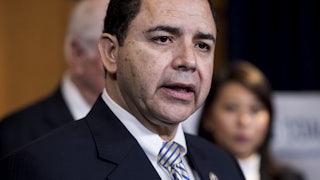Back in 2018, before she was the attorney general of Michigan, Dana Nessel was an attorney and activist with a past life in standup comedy. During her campaign, she released a low-budget advertisement called “#HangersR4clothes,” intending to make the argument for her election. It featured Nessel standing in an alley, talking about Roe v. Wade.
She said: “With the recent change in the makeup of the Supreme Court, the clock is on the verge of being turned back. Roe v. Wade is likely to be overturned soon, and laws that criminalize abortion remain on the books in Michigan. Whoever becomes our next attorney general will have the power to enforce these dangerous and unfair laws, which will drive women to the back alleys again.”
After making her case, Nessel defiantly throws a wire hanger onto a cardboard sign on the ground that reads “NEVER AGAIN” in black marker.
The political class mocked the ad as hyperbolic. And yet should Roe fall, as many expect will happen following the leaked Supreme Court opinion spelling its demise, not only will her alarm be proven nonhyperbolic, but Nessel will be one of the most consequential figures protecting millions of Michiganders from losing access to a safe and legal abortion.
Though a January poll found that nearly 80 percent of Michiganders support a woman’s right to choose, Michigan’s abortion ban is among the country’s most arcane. Under the 1931 law, abortion is felony manslaughter. The law includes no exceptions for rape or incest. And it could automatically go into effect should Roe fall. While a judge granted an injunction sought by Planned Parenthood of Michigan to stall enforcement of the decades-old law on Tuesday afternoon, the matter is far from settled.
Nessel has already committed to not enforcing the law. She’s also declined to defend the state against the Planned Parenthood lawsuit to block enforcement of the state law by the attorney general’s office or county prosecutors.
For her part, Governor Gretchen Whitmer has filed a lawsuit to have the 1931 law struck down as unconstitutional. The lawsuit argues that the state’s abortion ban violates the state Constitution’s due process clause and right to privacy and bodily autonomy. Her statement:
“No matter what happens to Roe, I am going to fight like hell and use all the tools I have as governor to ensure reproductive freedom is a right for all women in Michigan. If the U.S. Supreme Court refuses to protect the constitutional right to an abortion, the Michigan Supreme Court should step in. We must trust women—our family, neighbors, and friends—to make decisions that are best for them about their bodies and lives.”
However, the court’s willingness to hear the case and its present timeline remain unclear. Should the court hear the case before the end of the year, it’s also unclear who would defend the 1931 law, as Nessel would likely elect not to do so, given her choice in the Planned Parenthood case.
What is clear is that the right to a safe and legal abortion in Michigan hinges on the effort that two Democratic women make to keep it that way. But both are up for reelection in November.
Nessel’s opponent is Matt DePerno, a Trump-endorsed local attorney. On abortion rights, he has said, “I would enforce that law immediately when I am elected and sworn into office,” going even further than the law and indicating that he does not believe in exceptions for the life of the mother.
Whitmer’s opponent is yet to be decided but will be the eventual winner of the August primary. Early polling shows former Detroit Police Chief James Craig in the lead, though his campaign has struggled to hold onto campaign cash and may be ruled ineligible owing to fraudulent signatures on Craig’s ballot petitions. Craig has said, in a leaked secret recording, that “I am pro-life” and that he would stop Democrats from “undoing the law that makes abortion illegal in Michigan.”
Michigan is a classic purple state. And gubernatorial elections have gone the opposite way from the previous presidential election—in this case, Joe Biden’s in 2020—in each election since 1994. The most recent Morning Consult poll has President Biden underwater by 12 points. For her part, though FiveThirtyEight rated Michigan as one of 10 governor’s seats most likely to flip, Whitmer enjoys a net approval rating of four points, outperforming the president in the state.
There has been less polling in the attorney general’s race. In a January poll, Nessel’s name identification among Michigan voters was only 52 percent, though her net approval rating was 5 percent.
Alongside reelecting Whitmer and Nessel, Michigan voters could elect a state legislature that would change the law. Indeed, every single legislative seat in Michigan is up for reelection in 2022, as well. While Michigan’s state legislature has been flagrantly gerrymandered in the past, this is the first election since Michigan voters passed a redistricting overhaul, although analysts remain uncertain as to what that will mean for the partisan makeup of the body.
For now, Michiganders can still access safe, legal abortions. Roe has not yet fallen. The Supreme Court is likely to rule in the Dobbs case before July 4. Should it rule according to the draft leaked opinion, state law could immediately take away that right. So alongside their political future, Michigan voters could also be deciding on the future of a safe, legal abortion in Michigan come November. For millions of women, it’s crucial that they protect that right.








